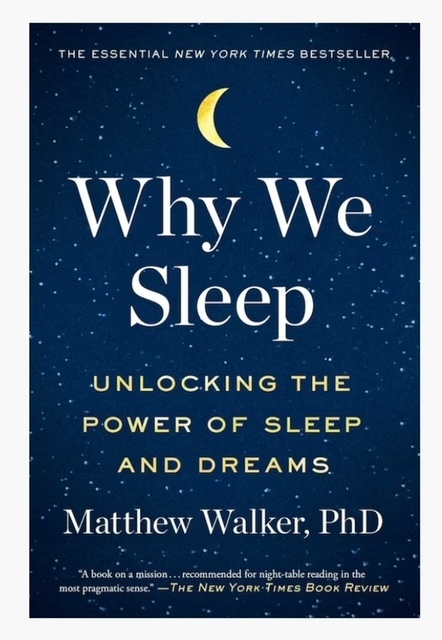
Why We Sleep: Unlocking the Power of Sleep and Dreams by Matthew Walker
This was such an insightful and fascinating book. I read it while juggling three small children, so some of the stats were terrifying as my sleep debt grew, my sleep was disrupted, and I survived on caffeine. The book highlights how impactful sleep can be on our everyday lives and how significantly it affects performance. The tips on how to get a good sleep are fantastic and something I use all the time now—a dark, cool room is a must, so I am grateful for my A/C. The science nerd in me loved all the details about our sleep stages and what our brain is doing during sleep. Sleep is magical, and we should all try to get more of it! Enjoy the summary below.
In "Why We Sleep," neuroscientist and sleep expert Matthew Walker delves deep into the science of sleep, revealing its critical importance for our physical and mental health. This comprehensive exploration highlights why sleep is not just a state of rest but a vital process essential for numerous bodily functions. Here's a detailed summary of the book's key concepts and insights.
The Importance of Sleep
Walker begins by emphasizing the fundamental importance of sleep, arguing that it is as crucial as food and water. He outlines how sleep affects every aspect of our health, from brain function to immune system efficiency. A lack of sleep can lead to serious health problems, including cognitive decline, weight gain, and increased susceptibility to illnesses.
The Stages of Sleep
The book provides an in-depth look at the different stages of sleep, particularly REM (Rapid Eye Movement) and non-REM sleep. Walker explains how these stages play unique roles in processing emotions, solidifying memories, and clearing out toxins from the brain. Each stage is crucial, and a disruption in the sleep cycle can have significant negative effects on mental and physical health.
Sleep and the Brain
Walker explores how sleep contributes to brain health. During sleep, the brain undergoes various processes that enhance learning, memory, and emotional regulation. REM sleep, for instance, is particularly important for creative problem-solving and emotional resilience. Walker also highlights the detrimental effects of sleep deprivation on cognitive functions and mental health, linking insufficient sleep to conditions such as depression, anxiety, and even Alzheimer's disease.
Sleep and the Body
Beyond the brain, Walker examines how sleep affects the rest of the body. He discusses the role of sleep in regulating hormones, metabolism, and the immune system. Poor sleep is linked to weight gain, diabetes, cardiovascular disease, and a weakened immune response. Walker also touches on the relationship between sleep and athletic performance, noting that adequate sleep can enhance physical performance and recovery.
The Sleep Crisis
Walker raises alarms about the global sleep crisis, citing modern lifestyle factors such as artificial light, irregular work hours, and the pervasive use of technology as major contributors to sleep deprivation. He emphasizes the societal impacts, including reduced productivity, increased healthcare costs, and higher rates of accidents.
Improving Sleep
The book concludes with practical advice on how to improve sleep quality. Walker provides tips on establishing a regular sleep schedule, creating a sleep-friendly environment, and avoiding substances that can interfere with sleep, such as caffeine and alcohol. He also discusses the importance of light exposure and the benefits of napping.
Key Takeaways:
- Sleep is essential for overall health: It impacts brain function, emotional well-being, and physical health.
- Understanding sleep stages: REM and non-REM sleep each play unique and crucial roles in maintaining health.
- Cognitive benefits: Sleep enhances learning, memory, and emotional regulation.
- Physical health: Adequate sleep supports hormonal balance, metabolism, and immune function.
- Global sleep crisis: Modern lifestyles are leading to widespread sleep deprivation with significant societal costs.
- Practical advice: Establishing good sleep habits can greatly improve sleep quality and overall health.
Conclusion
"Why We Sleep" is a compelling and informative read that underscores the vital role of sleep in our lives. Matthew Walker's thorough examination of the science behind sleep provides a clear understanding of why we must prioritize rest. By implementing the book's practical advice, we can improve our sleep habits, enhance our health, and lead more productive and fulfilling lives. This book is a must-read for anyone looking to understand the profound impact of sleep and how to harness its power for better living. Now get some sleep!

Jill Saban
Contact Me



